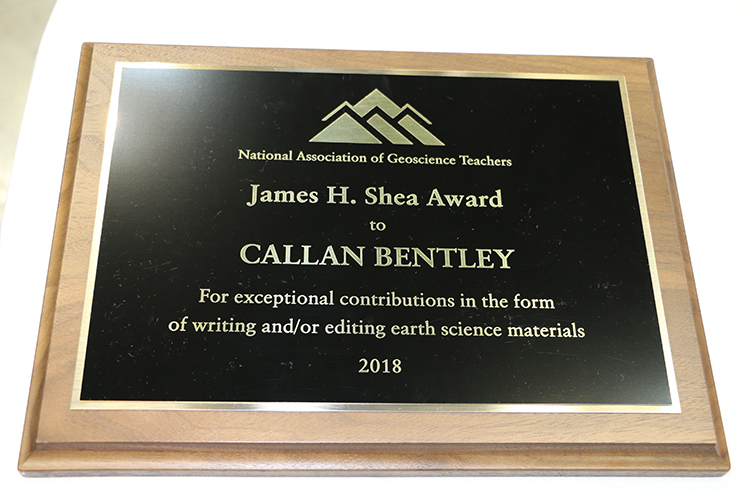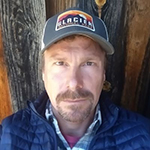6 November 2018
GSA report: the James Shea Award
Posted by Callan Bentley
I’m at the GSA Annual Meeting in Indianapolis this week, and I got an award today: the James Shea Award from the National Association of Geoscience Teachers.

I was introduced at the awards luncheon today by my co-nominator Kaatje Kraft, who had many nice things to say. I followed her comments with this little speech:
Thank you, Kaatje, and also to Joshua Villalobos for nominating me.
I’m getting this award for blogging. I write a blog, a geo-blog. This award is simultaneously an important validation of the blog as a medium for geoscience communication and outreach, in addition to honoring my particular individual contributions — but also something that also feels a little like a requiem. I say that because geology blogs in general, and mine in particular, have diminished in their productivity/presence/importance over the past several years, and particularly The Past Two.
Sharing science has been important to me from an early age. In college, I wrote a natural history column for the William & Mary student newspaper called “Wild Williamsburg.” That, I think, was my initial foray into communicating science to a nonscience audience, and I daresay it emboldened me.
In 2007, I had been hearing about blogs quite a bit, and decided that I could use the blog format to funnel news items and other cool digital ephemera to my students. I started NOVA Geoblog, and I found that almost instantly, it was being read much more by people who were not my students. These people were spread out all over, and they quickly became an extended community to me, a farflung network of colleagues and compatriots.
This was during the geoblogosphere’s “Cambrian Explosion,” and I was not alone in writing a blog about geology. Other geobloggers adopted social media platforms too to “flesh out their outreach portfolio,” and I followed as far as Twitter. This was when my blogging efforts changed their name to Mountain Beltway, and AGU elected to host it. Twitter has sapped some of the vitality from blogs, it would seem, and that platform has grown more dynamic and useful even as many blogs gather the digital equivalent of dust.
I’ve kept at mine, though, and celebrated a decade of writing it last fall. During those ten years, I’ve become a contributing editor at EARTH magazine, helped write textbooks, and even pushed out a few peer-reviewed articles into the scholarly literature. Each of these, plus that whole “email lifestyle,” saps a little bit from the drive to write on the blog. I also became a parent, and it turns out that cuts into your writing time, too! While my productivity on the blog has dropped off over the years, I can at least claim honestly that I’m more blogorific than most of my geoblogger peers have been able to maintain. I am proud of the body of work I’ve developed over the years, all of it instantly accessible via a Google search. Even if my writing has slackened, readership has stayed constant, as web searches bring new readers to material I published years ago. I can also point to an expanded reach in Twitter, which gets out the easy-to-write stuff without much effort.
There’s been another reason for my productivity decline.
A source of dismay for me, and a reason I find it hard to stay perky enough to write constantly about how cool geology is, is the erosion of norms in American governance. Our democracy has been shown to be unexpectedly fragile, and today’s midterm elections are the first great test of whether the citizenry will accept these changes, or will reject them.
Even if today’s election results turn out to be on the whole sane and science-affirming, I fear that we’re never going back to the way things used to be. Therefore, to tease a positive affirmation from this heartbreaking, nasty situation, let me say this: we have important work ahead of us. Democracy, like science, is a participant sport, and it only moves forward if it’s constantly maintained. The currents of counterfactualism and anti-intellectualism are stronger than ever, and we are the ones who must swim upstream. We teachers must communicate our understanding of the world and the way we have come to that understanding through nonpartisan means that anyone can practice, no matter their politics, their skin color, their level of physical ability, or their gender.
It is imperative that we be successful at this task. Nothing less than the fate of the planet’s biosphere (which includes, but is not limited to, human civilization) hinges on whether we succeed. The impartiality of science is a way forward for our civilization, and because of humanity’s immense intellectual power, for the rest of the Earth’s organisms as well. We need to protect science, this important tool, and the insights we derive from it, from being weakened through underfunding or the newly elevated primacy of ideology over reality.
Our work is essential. Let us be lucky enough to do it well.
Thank you.


 Callan Bentley is Associate Professor of Geology at Piedmont Virginia Community College in Charlottesville, Virginia. He is a Fellow of the Geological Society of America. For his work on this blog, the National Association of Geoscience Teachers recognized him with the James Shea Award. He has also won the Outstanding Faculty Award from the State Council on Higher Education in Virginia, and the Biggs Award for Excellence in Geoscience Teaching from the Geoscience Education Division of the Geological Society of America. In previous years, Callan served as a contributing editor at EARTH magazine, President of the Geological Society of Washington and President the Geo2YC division of NAGT.
Callan Bentley is Associate Professor of Geology at Piedmont Virginia Community College in Charlottesville, Virginia. He is a Fellow of the Geological Society of America. For his work on this blog, the National Association of Geoscience Teachers recognized him with the James Shea Award. He has also won the Outstanding Faculty Award from the State Council on Higher Education in Virginia, and the Biggs Award for Excellence in Geoscience Teaching from the Geoscience Education Division of the Geological Society of America. In previous years, Callan served as a contributing editor at EARTH magazine, President of the Geological Society of Washington and President the Geo2YC division of NAGT.
Very well said. We must not give up.
Congratulations and keep up the good work!
I’ve been following your blog from Sweden for a few years now, and I always am looking forwards to reading your latest posts.
Thanks!
Well deserved, Callan. And welcome back to ASU today!